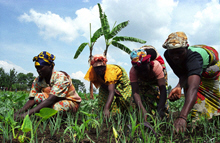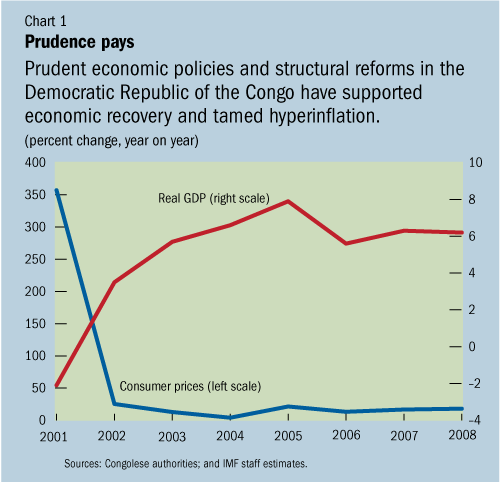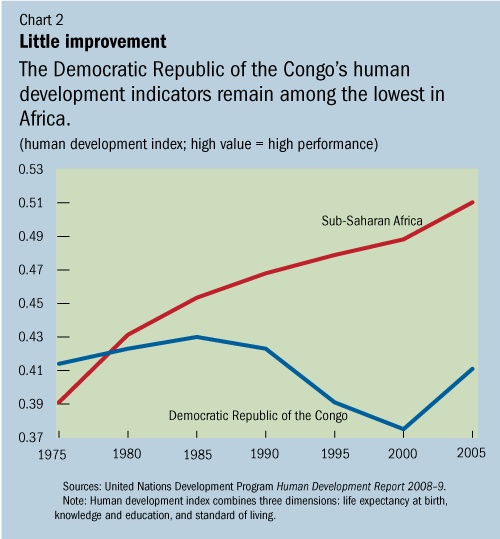
Typical street scene in Santa Ana, El Salvador. (Photo: iStock)
IMF Survey: Democratic Republic of the Congo Gets $551 Million IMF Loan
December 11, 2009
- Post-conflict country hard hit by effects of global economic crisis
- Loan to support authorities' poverty reduction, growth strategy
- External debt outlook remains problematic without debt relief
The IMF approved on December 11 a loan of $551 million to the Democratic Republic of the Congo to support the implementation of the country’s poverty reduction and growth strategy.

Workers tend crops in Democratic Republic of the Congo, which faces daunting development tasks following decade-long conflict (photo: Newscom)
CENTRAL AFRICA
The loan, extended under the IMF’s Poverty Reduction and Growth Facility, will support a three-year program that aims to increase domestic revenues, enhance public expenditure management, reform the financial system including the central bank, and improve the business and investment climate.
The IMF also provided $73 million in additional interim assistance under the enhanced Heavily Indebted Poor Countries (HIPC) Initiative.
Post-conflict and debt-distressed country
Following a decade-long conflict, the Democratic Republic of the Congo faces daunting development tasks. Since 2001, there has been important progress, notably the transition to a democratically elected government and the implementation of prudent economic policies and structural reforms that supported economic recovery and tamed hyperinflation (see Chart 1).

In spite of this progress, the country’s per capita income and human development indicators remain among the lowest in Africa (see Chart 2) and the insufficient domestic revenue mobilization effort, high external debt burden, and unsettled security situation in the eastern provinces continue to hamper post-conflict reconstruction, particularly regarding the rehabilitation of the country’s dilapidated physical infrastructure. The onset of the global financial crisis has further aggravated the situation by slowing down economic activity.

The Democratic Republic of the Congo also faces external debt distress. The stock of public and publicly guaranteed external debt is estimated at $13 billion at end-2008. In present value terms, it is estimated at 93 percent of GDP, 150 percent of exports, and 501 percent of government revenue excluding grants, well above the norms for such a country.
Program objectives
The program’s objectives are average real GDP growth of 6.5 percent; an end-period inflation rate of 9 percent by 2012; gross reserves equivalent to 10 weeks of nonaid imports in 2012; and an external current account deficit, including grants, limited to 25 percent of GDP on average.
Enhancing economic growth: given the importance of strong and sustained economic growth for poverty reduction, the authorities are committed to reforming public enterprises that provide growth-critical services, and streamlining the regulatory environment. They will also deepen financial intermediation, including by restructuring and recapitalizing the central bank while strengthening its capacity to supervise the financial sector.
Domestic revenue mobilization: the objective is to increase the revenue-to-GDP ratio from about 16 percent in 2009 to about 20 percent in 2012. This will be achieved by strengthening customs and tax administration, streamlining and simplifying the tax system, and introducing a value added tax.
External debt relief: the program will also help achieve substantial debt relief and mobilize additional donor assistance. By reaching the completion point under the enhanced HIPC Initiative, the country could benefit from debt relief of roughly $9 billion. However, the country’s external debt outlook will remain vulnerable to adverse exogenous shocks even after debt relief. Going forward, it is essential, therefore, that the authorities rely on grants and highly concessional loans to finance its development. The country’s development partners are also expected to step up budget assistance in support of the authorities’ reform agenda
Public expenditure management: the authorities will bolster budget planning and execution, reinforce budget controls, improve transparency of government operations, and allocate more resources to priority spending.


